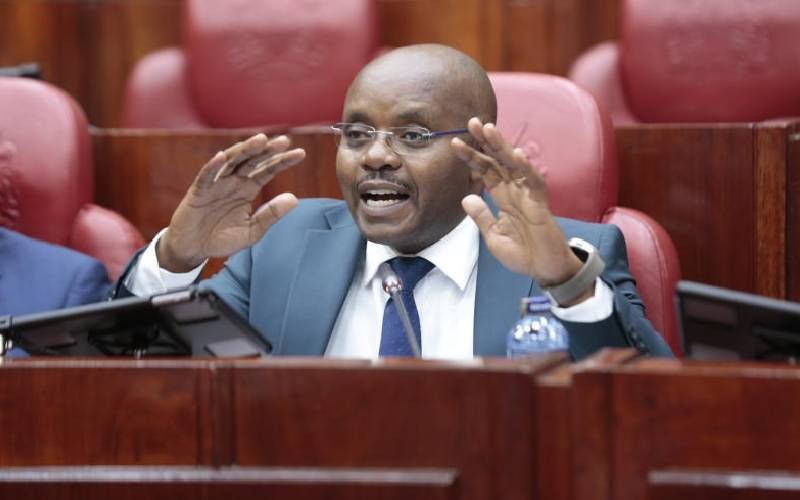Are we living in normal or abnormal times? Is there any time in the near future that the security of the country will, as it were, be normal? Is law and order still a possibility as an aspect of normal government that we have always assumed to be the case at any time? Is it possible to accept to live with corruption because this is what has become “normal” in both public and private life? Is begging to be tolerated as an aspect of our lives, whether in church, business and among relatives, let alone where everybody else begs from politicians?
I am asking these questions because, over the last three years, life in Kenya—both private and public—has changed so radically that I have started questioning what I have always taken and assumed to be normal. At times I go to church and the sermon is so good I feel spiritually uplifted and energised almost instantaneously I get thoroughly deflated when, in the end, the preacher resorts to begging from the church for some material advantage. I do accept, of course, that the church cannot be run by the Holy Spirit alone; there must be some institutional mechanism for material sustenance of the church. What I find upsetting is for any preacher to use the pulpit to collect personal alms. Jesus never did this. But let me get back to the body economic.
The first ten years of independence were great for economic prosperity of this nation notwithstanding our rapid degeneration into authoritarian rule under Kanu. The figures speak for themselves and the state institutions that were responsible for prosperity, though finally destroyed or put to disuse, have records that political economists can chronicle.
Then came the reformist NARC government of 2003 to 2007. Notwithstanding the problems that NARC ran into regarding how to manage a coalition government and the transition towards a new constitutional dispensation, the political and economic reforms undertaken achieved three things.
First, they restored public faith in the state: NARC government started its reform agenda with a near 100 per cent public approval. Second, with economic growth climbing to 5 per cent per year from zero within three years, it stimulated high rates of investments that continued well into the life of the coalition government in 2007-2013. The fruits of those investments have been harvested by the Jubilee government but rather incompetently managed. Third, the rather foolish recalcitrance of the NARC regime to constitutional reforms led it to hopelessly mismanage the December 2007 elections which culminated into the Post-Election Violence and its attendant consequences. An important outcome of this was that the state was forced to undertake far reaching constitutional reforms which had been outstanding for decades.
One would have thought that the Jubilee government would have ridden on these reforms and institutionalised them so as to gain credit for the achievements which necessarily belong to the previous regime. On the contrary Jubilee seems to be bent on reversing these advances so as to write a new Kenyan history, no doubt with disastrous consequences. For example, the current problems rotating around insecurity, bureaucratic corruption, bureaucratic lethargy and diplomatic isolation all require galvanising Kenyans together for a non-partisan approach to problem solving. After all, Article 129(2) states that “executive authority shall be exercised in a manner compatible with the principle of service of the people of Kenya, and for their well-being and benefit.”
I believe that the opposition represents close to, if not more than, 50 per cent of these Kenyans. Left unattended, they could easily become alienated, lethargic and indifferent. At a moment of crisis where all national energies are needed to pull the nation from a hole, the call by CORD for a national dialogue was timely, but it was rejected by the Jubilee administration.
An alternative framework in the fashion of Moi’s IPPG was not coming from the Jubilee side either. The end result has been the deepening of all these problems to the detriment of our social well-being and the increasing jeopardy to doing business in Kenya.
There is no doubt therefore that everywhere one turns in our republic there is an air of pessimism. People do not seem to invest into the future; they want to live for today for whatever it is worth. That, perhaps, is why the preachers are uplifting our spirits with the word of God and then asking for alms to pay for their rent and the school fees for their children. That, perhaps, is why the civil servants in the Jubilee administration are looting public resources with abandon; and even the indomitable IFMIS cannot stand in their way.
What I fear is that, in this kind of atmosphere, some pessimists may go as far as suggesting that devolution cannot really work. It has been born in an atmosphere that is unfavourable to building for the future: pro futuro edificanos (we build for the future) as the Makerere University motto runs. We must resist the germination of such ideas in our midst.
Though fraught with problems, devolution is perhaps the most practical antithesis to the over centralisation of development resources that has bred bureaucratic corruption in our republic since independence. It is much easier to fight such corruption in devolved governments than it is in the national government. And that is why I have much more hope for the future.
Though the absurd seems to be increasingly resembling the normal, we have a greater opportunity to change the course of the history of our nation by trusting more and more government in the hands of our people. Yes, life is indeed tough, and may even be tougher in the next couple of years. But the last thing we should do is lose hope in ourselves. The ability to be inventive seems to emerge from among the young. Let us secure the future for them by preventing those who want to live from hand to mouth from dictating the terms of governance in our nation.
 The Standard Group Plc is a
multi-media organization with investments in media platforms spanning newspaper
print operations, television, radio broadcasting, digital and online services. The
Standard Group is recognized as a leading multi-media house in Kenya with a key
influence in matters of national and international interest.
The Standard Group Plc is a
multi-media organization with investments in media platforms spanning newspaper
print operations, television, radio broadcasting, digital and online services. The
Standard Group is recognized as a leading multi-media house in Kenya with a key
influence in matters of national and international interest.
 The Standard Group Plc is a
multi-media organization with investments in media platforms spanning newspaper
print operations, television, radio broadcasting, digital and online services. The
Standard Group is recognized as a leading multi-media house in Kenya with a key
influence in matters of national and international interest.
The Standard Group Plc is a
multi-media organization with investments in media platforms spanning newspaper
print operations, television, radio broadcasting, digital and online services. The
Standard Group is recognized as a leading multi-media house in Kenya with a key
influence in matters of national and international interest.








